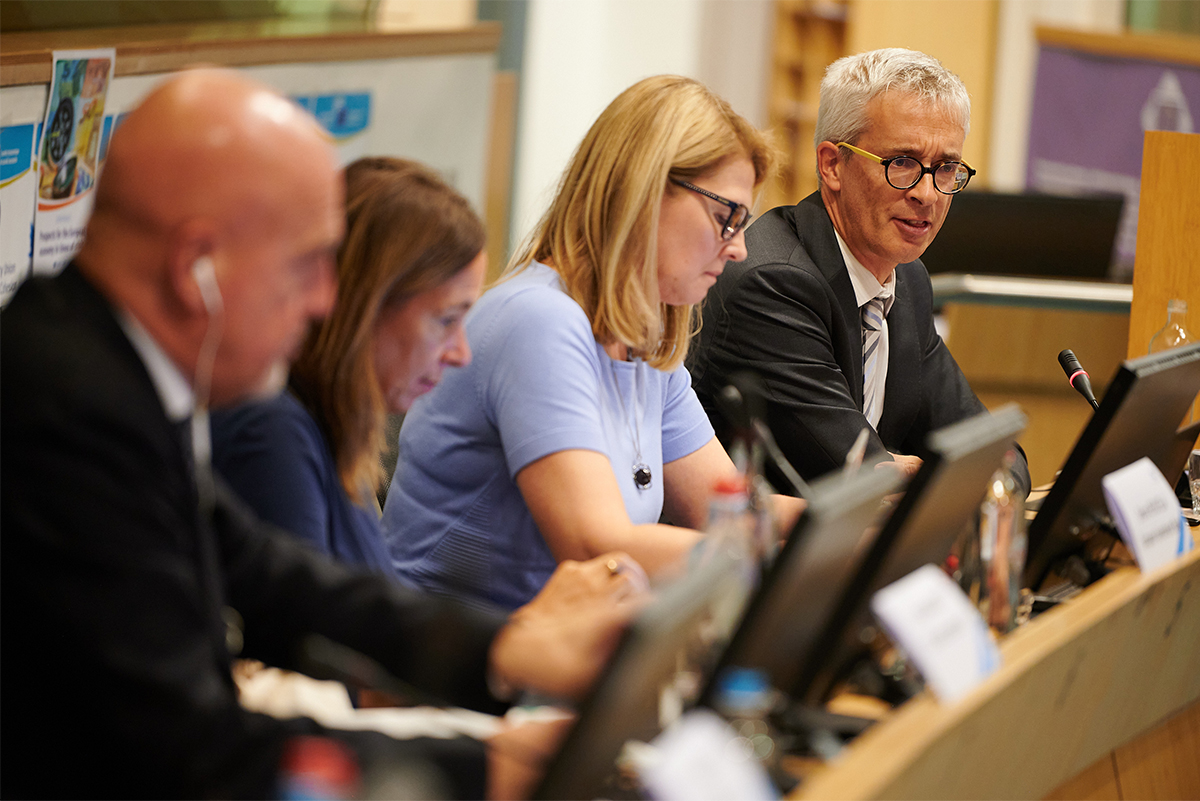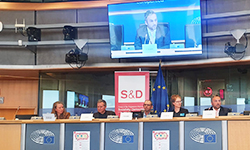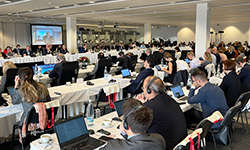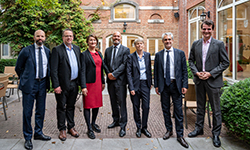BusinessEurope Headlines No. 2022-30
Businesses face increasing challenging conditions to operate

With companies across Europe facing the prospect of an extremely challenging winter, policy-makers need to use every lever at their disposal to combat inflation and avoid a deep recession. This was the key message of BusinessEurope's Chief Economist, James Watson, at a conference organised by the European Economic and Social Committee on 5 October entitled “Prospects for the European economy in times of crisis”. Whilst the EU economy grew relatively strongly in the first 6 months of 2022, following further reopening of the service sector, both business and consumer sentiment has fallen dramatically during the summer as companies are increasingly unable to further absorb high energy and raw material costs, James explained. He noted that many companies, who were already having to cope with record skill shortages, are now facing the prospect of higher borrowing costs, and lower consumer demand. BusinessEurope's full autumn forecast will be published on 7 November.
Contact: James Watson
Our comment
E-declaration for posting of workers is key for solving problems companies face
By Maxime Cerutti, Director for Social Affairs
 In the context of its communication of 5 May 2021 “Updating the 2020 New Industrial Strategy: Building a stronger Single Market for Europe’s recovery”, the European Commission announced its plan to work with Member States to devise a common form, in an electronic format, for the declaration of posting of workers.
In the context of its communication of 5 May 2021 “Updating the 2020 New Industrial Strategy: Building a stronger Single Market for Europe’s recovery”, the European Commission announced its plan to work with Member States to devise a common form, in an electronic format, for the declaration of posting of workers.
The initiative aims to make it easier for service providers to post workers in the EU single market. Since the 2014 Enforcement Directive entered into force, Member States have implemented differing national posting notification systems, which poses a major challenge for companies. In some cases, the national notification procedure is so burdensome that it prevents companies from sending their workers into another Member State.
By providing a common and electronic form, the e-declaration shall contribute to overcoming two key problems that service providers meet in practice:
- Lack of, fragmented or unclear information regarding the documentation, translations, registration requirements and the responsible authorities in different Member States;
- High administrative burden and/or administrative delays on the side of national authorities and associated costs borne by the service providers.
We are now at a crucial stage in the process of creating at the EU level a voluntary e-declaration for the notification of postings. A good number of Member States have already expressed their support to this initiative, while some have not yet positioned themselves.
We fully support and are actively engaged in this initiative of the European Commission. For it to be successful, it is essential that as many Member States as possible clearly indicate their intention to make use of this EU-wide e-declaration. Moreover, the potential of digital solutions to simplify the administrative requirements for companies in relation to the notification of postings should be tapped.
At the same time, it is crucial that the proposed standardised e-declaration does not incentivise or give leeway to Member States to impose additional, excessive requirements on service providers, including with regard to reporting requirements, which would in turn hamper the smooth functioning of the EU single market.
The Council is in the process of looking into this, and a Commission’s proposal should follow. When assessing this initiative, Member States need to give priority to improving the functioning of the single market for service providers and posted workers, without creating additional barriers to the free movement of services.
Contact: Cerutti Maxime
Key messages to the EU Environment Council
 On 11 October, BusinessEurope’s Director General, Markus J. Beyrer, shared business views on the EU position for COP27, the revision of the Industrial Emissions Directive (IED 2.0) and the Ecodesign for Sustainable Products Regulation (ESPR) with the Czech Environment Minister, Anna Hubácková, ahead of the Environment Council to be held on 24 October. In its letter, BusinessEurope urged the EU’s negotiators at COP27 to constructively engage on climate finance, in order to enable a closing of the remaining gaps in ambition between the EU and its international partners when it comes to emission saving targets. In addition, BusinessEurope underlined that progress on Article 6 of the Paris Agreement is essential to combat global climate change. Beyrer further shared concerns about the IED 2.0 not supporting industrial transformation. He explained that despite the good intentions of the European Commission, in its current form the IED 2.0 creates additional hurdles, generates uncertainties and leads to disproportionate costs. Conversely, he welcomed the Commission ESPR proposal as it further supports EU’s environmental commitments and economic resilience. On this topic, BusinessEurope shared its contributions to support the enforceability of the Commission’s proposal.
On 11 October, BusinessEurope’s Director General, Markus J. Beyrer, shared business views on the EU position for COP27, the revision of the Industrial Emissions Directive (IED 2.0) and the Ecodesign for Sustainable Products Regulation (ESPR) with the Czech Environment Minister, Anna Hubácková, ahead of the Environment Council to be held on 24 October. In its letter, BusinessEurope urged the EU’s negotiators at COP27 to constructively engage on climate finance, in order to enable a closing of the remaining gaps in ambition between the EU and its international partners when it comes to emission saving targets. In addition, BusinessEurope underlined that progress on Article 6 of the Paris Agreement is essential to combat global climate change. Beyrer further shared concerns about the IED 2.0 not supporting industrial transformation. He explained that despite the good intentions of the European Commission, in its current form the IED 2.0 creates additional hurdles, generates uncertainties and leads to disproportionate costs. Conversely, he welcomed the Commission ESPR proposal as it further supports EU’s environmental commitments and economic resilience. On this topic, BusinessEurope shared its contributions to support the enforceability of the Commission’s proposal.
![]() Contact: Carolina Vigo
Contact: Carolina Vigo
A new look at European investment in China
 “Relations between the EU and China have been facing considerable challenges in recent times. On the one hand, European companies are confronted with significant market access asymmetries, which have been exacerbated by the increased politicisation of the Chinese business environment. On the other hand, new geopolitical risk factors have emerged”, said Luisa Santos, Deputy Director General of BusinessEurope, at the joint BusinessEurope-Rhodium Group webinar “European FDI in China: Recent trends and their implications”. At the event, which took place on 11 October 2022, Agatha Kratz, Director at Rhodium Group, and Noah Barkin, Managing Editor at Rhodium Group, presented the main insights of their recent paper “The Chosen Few: A Fresh Look at European FDI in China”. This report showcases that European investment in China has become more concentrated in the past four years, both in terms of the companies that invest there, the countries they come from, and the sectors in which they operate. “The Rhodium Group study shows clearly that the political trajectory chosen by China has made it more difficult for newcomers to enter this vast market, although European investment in China remains far below its potential”, Santos added. She stated that this situation is unlikely to change anytime soon. In the current geopolitical environment, it will thus be crucial for European companies to thoroughly assess the short and long-term risks deriving from any overreliance and exposure to the Chinese market and take mitigating measures accordingly.
“Relations between the EU and China have been facing considerable challenges in recent times. On the one hand, European companies are confronted with significant market access asymmetries, which have been exacerbated by the increased politicisation of the Chinese business environment. On the other hand, new geopolitical risk factors have emerged”, said Luisa Santos, Deputy Director General of BusinessEurope, at the joint BusinessEurope-Rhodium Group webinar “European FDI in China: Recent trends and their implications”. At the event, which took place on 11 October 2022, Agatha Kratz, Director at Rhodium Group, and Noah Barkin, Managing Editor at Rhodium Group, presented the main insights of their recent paper “The Chosen Few: A Fresh Look at European FDI in China”. This report showcases that European investment in China has become more concentrated in the past four years, both in terms of the companies that invest there, the countries they come from, and the sectors in which they operate. “The Rhodium Group study shows clearly that the political trajectory chosen by China has made it more difficult for newcomers to enter this vast market, although European investment in China remains far below its potential”, Santos added. She stated that this situation is unlikely to change anytime soon. In the current geopolitical environment, it will thus be crucial for European companies to thoroughly assess the short and long-term risks deriving from any overreliance and exposure to the Chinese market and take mitigating measures accordingly.
Contacts: Benedikt Wiedenhofer, Elena Suárez
Due diligence discussed in the European Parliament
 On 12 October, BusinessEurope Director for Legal Affairs Pedro Oliveira took part in the S&D Group event “People, Planet and Profit - Debating the future of due diligence”, in the European Parliament. He stressed the need for a truly harmonised regime, the deletion of overlapping and unjustified directors' duties and more realistic obligations. The topic of due diligence was also discussed the day before at a dedicated event covering the SME angle of the due diligence proposal. The debate, co-hosted by BusinessEurope and the SME Intergroup of the European Parliament, featured the participation of the Intergroup co-chairs, MEP Winzig and MEP Dlabajova, as well as other Members of the European Parliament, the European Commission and SME representatives. In his remarks, Oliveira stressed that “due diligence is about encouraging companies to identify and solve problems, not about punishing them”, and that “although SMEs are not formally in the scope of the proposal, they will be largely impacted and need clear and proportional rules”.
On 12 October, BusinessEurope Director for Legal Affairs Pedro Oliveira took part in the S&D Group event “People, Planet and Profit - Debating the future of due diligence”, in the European Parliament. He stressed the need for a truly harmonised regime, the deletion of overlapping and unjustified directors' duties and more realistic obligations. The topic of due diligence was also discussed the day before at a dedicated event covering the SME angle of the due diligence proposal. The debate, co-hosted by BusinessEurope and the SME Intergroup of the European Parliament, featured the participation of the Intergroup co-chairs, MEP Winzig and MEP Dlabajova, as well as other Members of the European Parliament, the European Commission and SME representatives. In his remarks, Oliveira stressed that “due diligence is about encouraging companies to identify and solve problems, not about punishing them”, and that “although SMEs are not formally in the scope of the proposal, they will be largely impacted and need clear and proportional rules”.
Contact: Pedro Oliveira
Labour and skills shortages remain a crucial issue
 Labour and skills shortages put additional pressure on labour markets as a growing number of companies depends on a shrinking number of workers, which results in a fierce competition for talent and higher labour costs. That is why it is important that the European Commission includes a credible EU policy initiative to improve skills matching in its work programme for 2023. The pilot of a talent pool that is currently set in motion for Ukrainian refugees has potential. But the need for third-country legal migration is much bigger; the EU talent pool should therefore be expanded to other third countries rapidly. A key concern for European employers is that several factors have been at play for several years which have been pushing up wages, including politically driven minimum wage increases. By contrast, we need to avoid a dangerous wage-price spiral. Another important issue in the short term is to be particularly attentive to non-wage labour costs. It is important to reduce them where possible, making good use of the extra resources that governments receive through taxes on commodities and other products in the context of high inflation. Many companies of all sizes across the continent have already reduced their output or even shut down their production completely due to the energy crisis. In this changing context, it may soon become important to support employers in creating jobs. These were the key messages passed by Maxime Cerutti, Social Affairs Director, at the informal Employment, Social Policy, Health and Consumer Affairs (EPSCO) Council meeting taking place in Prague today and tomorrow.
Labour and skills shortages put additional pressure on labour markets as a growing number of companies depends on a shrinking number of workers, which results in a fierce competition for talent and higher labour costs. That is why it is important that the European Commission includes a credible EU policy initiative to improve skills matching in its work programme for 2023. The pilot of a talent pool that is currently set in motion for Ukrainian refugees has potential. But the need for third-country legal migration is much bigger; the EU talent pool should therefore be expanded to other third countries rapidly. A key concern for European employers is that several factors have been at play for several years which have been pushing up wages, including politically driven minimum wage increases. By contrast, we need to avoid a dangerous wage-price spiral. Another important issue in the short term is to be particularly attentive to non-wage labour costs. It is important to reduce them where possible, making good use of the extra resources that governments receive through taxes on commodities and other products in the context of high inflation. Many companies of all sizes across the continent have already reduced their output or even shut down their production completely due to the energy crisis. In this changing context, it may soon become important to support employers in creating jobs. These were the key messages passed by Maxime Cerutti, Social Affairs Director, at the informal Employment, Social Policy, Health and Consumer Affairs (EPSCO) Council meeting taking place in Prague today and tomorrow.
Contact: Cerutti Maxime
A need for more scrutiny on delegated acts
 With the exponential increase of the use of delegated acts by the European Commission over the last years, also confirmed by a recent report from Lund University (Sweden), the business community has very deep concerns about how delegated acts are changing the EU regulatory architecture and investment climate. BusinessEurope members identified a number of examples where consultations on delegated acts with stakeholders and the democratic scrutiny more generally did not seem to work as it should have. To highlight the accumulating challenges in the process of drafting and agreeing on delegated acts to the European Commission, the EU Council and the European Parliament, BusinessEurope adopted its position paper Delegated Acts: streamlining the scrutiny and looks forward to a dialogue on how to systemically improve the situation.
With the exponential increase of the use of delegated acts by the European Commission over the last years, also confirmed by a recent report from Lund University (Sweden), the business community has very deep concerns about how delegated acts are changing the EU regulatory architecture and investment climate. BusinessEurope members identified a number of examples where consultations on delegated acts with stakeholders and the democratic scrutiny more generally did not seem to work as it should have. To highlight the accumulating challenges in the process of drafting and agreeing on delegated acts to the European Commission, the EU Council and the European Parliament, BusinessEurope adopted its position paper Delegated Acts: streamlining the scrutiny and looks forward to a dialogue on how to systemically improve the situation.
![]() Contact: Martynas Barysas
Contact: Martynas Barysas
Stocktake of progress on corporate tax developments
 Businesses will need sufficient time to enable themselves to adapt their IT systems to comply with the detailed requirements of the EU’s implementation of the Organisation for Economic Co-operation and Development’s (OECD) minimum tax proposals. This was the key message of members of BusinessEurope’s Tax Policy Group during an exchange of views with Benjamin Angel, Director for Direct Taxation, Tax Coordination, Economic Analysis and Evaluation at the European Commission Directorate-General for Taxation and Customs Union on 11 October. As well as discussing the progress of the minimum tax proposals, which BusinessEurope continues to support, provided the EU is not alone in actually implementing, members also raised points related to the Solidarity Tax on energy companies, withholding tax simplification measures, and the Commission’s recent announcement of a proposal for BEFIT (Business in Europe: Framework for Income Taxation), at the session with Angel.
Businesses will need sufficient time to enable themselves to adapt their IT systems to comply with the detailed requirements of the EU’s implementation of the Organisation for Economic Co-operation and Development’s (OECD) minimum tax proposals. This was the key message of members of BusinessEurope’s Tax Policy Group during an exchange of views with Benjamin Angel, Director for Direct Taxation, Tax Coordination, Economic Analysis and Evaluation at the European Commission Directorate-General for Taxation and Customs Union on 11 October. As well as discussing the progress of the minimum tax proposals, which BusinessEurope continues to support, provided the EU is not alone in actually implementing, members also raised points related to the Solidarity Tax on energy companies, withholding tax simplification measures, and the Commission’s recent announcement of a proposal for BEFIT (Business in Europe: Framework for Income Taxation), at the session with Angel.
![]() Contact: Mariella Caruana
Contact: Mariella Caruana
The upcoming Swedish EU Presidency has a crucial role to play on social dialogue
 The upcoming Swedish Presidency of the Council of the EU has a key role to play to mobilise the Member States to increase the space for social dialogue and collective bargaining in the countries where this is needed, and find ways to ensure that future EU social legislative initiatives better respect national competences and social partner autonomy. This was the key message of Maxime Cerutti, BusinessEurope Director for Social Affairs, during the seminar ''Making social dialogue work – key factors for success'', organised by the Swedish Labour Market Council for EU Affairs, on 10 October 2022. The upcoming EU social dialogue initiative is a golden opportunity for the European Commission to strengthen the tripartite social dialogue as part of Europe’s social dimension. This should be done, building on the relevant existing structures of the Employment, Social Policy, Health and Consumer Affairs (EPSCO) Council, i.e. the Employment Committee and the Social Protection Committee. A future Council recommendation on social dialogue should pave the way for a strengthened cooperation between the Commission, Member States and social partners to improve the performance of labour markets and social systems. This is particularly essential at the moment, when there are key issues to resolve such as labour and skills shortages and the sustainable financing of social protection.
The upcoming Swedish Presidency of the Council of the EU has a key role to play to mobilise the Member States to increase the space for social dialogue and collective bargaining in the countries where this is needed, and find ways to ensure that future EU social legislative initiatives better respect national competences and social partner autonomy. This was the key message of Maxime Cerutti, BusinessEurope Director for Social Affairs, during the seminar ''Making social dialogue work – key factors for success'', organised by the Swedish Labour Market Council for EU Affairs, on 10 October 2022. The upcoming EU social dialogue initiative is a golden opportunity for the European Commission to strengthen the tripartite social dialogue as part of Europe’s social dimension. This should be done, building on the relevant existing structures of the Employment, Social Policy, Health and Consumer Affairs (EPSCO) Council, i.e. the Employment Committee and the Social Protection Committee. A future Council recommendation on social dialogue should pave the way for a strengthened cooperation between the Commission, Member States and social partners to improve the performance of labour markets and social systems. This is particularly essential at the moment, when there are key issues to resolve such as labour and skills shortages and the sustainable financing of social protection.
Contact: Cerutti Maxime
Photo copyright: Valérie Therasse
Calendar 
- 12-14 October: European Forum for New Ideas 2022
- 7-18 November: United Nations Climate Change Conference 2022 (UNFCCC COP 27)
- 15-16 November: G20 Bali Summit
- 16-17 November: European Business Summit
Not yet a subscriber? Register here.
Reminder: please have a look at our privacy policy